22 stycznia 2018 r., niedługo przed Międzynarodowym Dniem Pamięci o Ofiarach Holocaustu (27 stycznia 2018), dr Mohammad Al-’Issa, sekretarz generalny mieszczącej się w Arabii Saudyjskiej Ligi Świata Muzułmańskiego (MWL0, wysłał list do Sary Bloomfield, dyrektorki U.S. Holocaust Memorial Museum w Waszyngtonie, w którym w wyjątkowo ostrych słowach potępił Holocaust, opisując go jako „wydarzenie, które do głębi wstrząsnęło ludzkością i którego koszmarowi nie może zaprzeczyć ani umniejszyć żaden bezstronny i miłujący pokój człowiek”. Dodał, że “Ta ludzka tragedia dokonana przez nikczemny nazizm nie może być zapomniana przez historię ani spotkać się z aprobatą kogokolwiek poza zbrodniczymi nazistami lub innymi ich gatunku”[1].
Al-’Issa zwrócił ostatnio na siebie uwagę mediów próbami złagodzenia napięć między muzułmanami a Zachodem oraz poparciem tolerancji religijnej i międzywyznaniowego dialogu. W maju 2017 r. wezwał muzułmanów mieszkających na Zachodzie, by szanowali miejscowe prawa zakazujące zasłon, jeśli kraj, w którym żyją, ma takie prawa, lub przeprowadzili się do jakiegoś innego kraju, w którym można swobodnie nosić zasłony[2]. W listopadzie 2017r. spotkał się z Naczelnym Rabinem Francji i głową Wielkiej Synagogi w Paryżu, odwiedził synagogę, stając się pierwszym wysoko postawionym duchownym saudyjskim, który to zrobił[3]. W przemówieniu w lutym 2018 r. na konferencji Alliance of Virtue for the Common Good w Waszyngtonie, zorganizowanej przez Parlament Religii Świata, Al-’Issa wezwał do szanowania wielości idei i ostrzegł przed działalnością zwolenników nowych nazistów, którzy zachęcają do barbarzyństwa. Wypowiedział się też przeciwko poparciu dostarczanemu im przez religijnych przywódców, czasami udzielanemu nieświadomie[4]. Niedawno odwiedził także Papieską Akademię Nauk w Watykanie[5] i spotkał się z Douglasem Padgettem, starszym doradcą do zwalczania przemocy ekstremizmu w Departamencie Stanu USA[6].
Słowa Al-’Issay w liście potępiającym Holocaust, które są niezwykłe dla członka religijnego establishmentu saudyjskiego, wywołały ostrą krytykę w mediach społecznościowych, gdzie oskarżano go oraz MWL o ignorowanie zbrodni dokonanych wobec Arabów, a szczególnie wobec Palestyńczyków. Natomiast w artykułach lokalnej i międzynarodowej prasy saudyjskiej występowano w obronie Al-‘Issy, mówiąc, że z pewnością rozpoznaje on niesprawiedliwości popełnione wobec Arabów i Palestyńczyków w przeszłości i obecnie. W niektórych artykułach wzywano także świat arabski do poparcia jego wypowiedzi i do pójścia za jego przykładem.
Poniże podajemy wybór [nie spolszczonych] krytycznych reakcji na jego list w mediach społecznościowych oraz fragmenty kilku artykułów w prasie saudyjskiej, które go bronią.
Criticism Of Al-’Issa’s Letter On Social Media
As stated, Al-’Issa’s letter sparked criticism from social media users in Saudi Arabia and the Arab world. According to a report in the Saudi press, the criticism appeared mostly „on extremist sites, papers and networks,” i.e., on media critical of the Saudi regime. Many of the critical posts on Twitter were from Qataris and appeared under the hashtag „Saudi Arabia expresses sympathy for Holocaust [victims].”[7] Other tweets claimed that by addressing the crimes of the Nazis, Al-’Issa ignored the disasters afflicting the Arab world.
A cartoon posted on Twitter shows Al-’Issa standing on the corpses of victims from Syria, Iraq, Palestine, and Myanmar, and saying: „Any denial of the Holocaust is a crime.”[8]
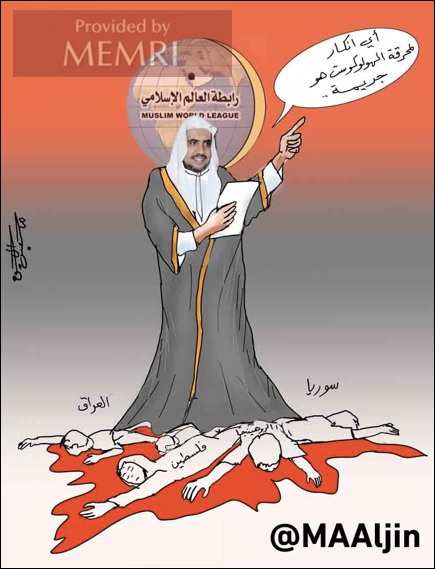
Saudi Twitter user Abu 'Abd Al-’Aziz wrote: „The statement of the Muslim World League secretary-general about the #Holocaust is odd. Had he tied [the statement] to the crimes of the Zionists, we might have regarded this as an excuse, but I do not see the point in this statement.”[9]
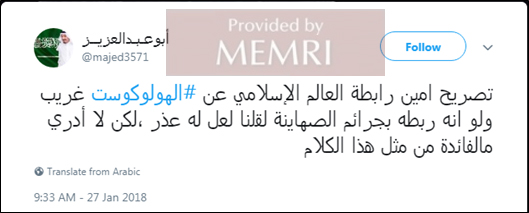
Saudi Twitter user Suliman Al-Wadakhi also tweeted indignation at how the MWL referred to the Holocaust: „The Holocaust was indeed a crime, as were the French massacres of the Algerians! There are hundreds of crimes against nations that go unmentioned and undocumented. [Why is it that] only the Holocaust is mentioned?”[10]
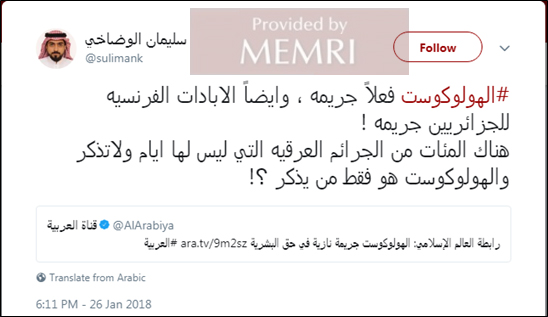
User 'Amar Al-Ataig Al-Ghouta, who frequently tweets on Saudi affairs and against the Saudi regime, tweeted: „Mohammad Al-’Issa weeps over the massacre of Jews in the Holocaust, while ignoring the Muslims killed in Gaza and Syria and the massacre of the Rohingya [in Myanmar]. This is Saudi Arabia, whose implementation of the Islamic shari’a is giving us a headache.”[11]
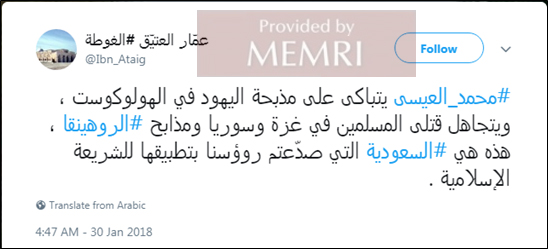
Majdy Obeidat, from Jordan, tweeted that „the Zionists are rejoicing” over Mohammad Al-’Issa’s statement, and asked: „Has the [Muslim World] League forgotten the systematic murder and siege that Israel is perpetrating against the Palestinians?!”[12]
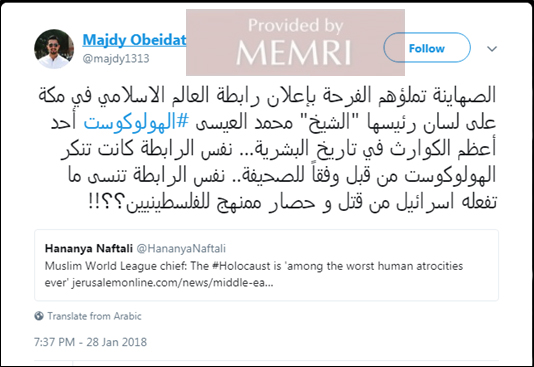
Saudi Writers Defend Al-’Issa’s Letter
Dr. Mohammad Al-’Issa’s letter, dated January 22, 2018, was reported on in the Saudi press on January 27. In contrast to his assertion in the letter that he was writing „on the occasion of the International Holocaust Remembrance Day,” both the Saudi media and the MWL stated that according to MWL spokesman 'Adel Al-Harbi, the letter was written against the backdrop of the MWL’s participation in the conference „Tackling Violence Committed in the Name of Religion,” organized by the British Foreign Office in Rome, which marked the occasion of International Holocaust Remembrance Day.[13] These statements were made even though Al-’Issa’s address at the conference focused not on the Holocaust, but on the need for religious institutions to confront extremism.[14]
For the most part, the articles in the Saudi press about the letter defended it and took care to underline that although Al-’Issa focused on the Holocaust, his doing so did not detract from acknowledging other injustices throughout history, particularly the suffering of the Palestinian people. At the same time, some of the writers expressed explicit support for Al-’Issa’s message in the letter, and called to adopt the values he set out and to develop the activities of institutions such as the MWL along these lines.
The following are excerpts from these articles.
Al-Hayat Columnist: Al-’Issa’s Letter Presents A Moderate Islam To The West – But The Zionist Slaughter Of The Palestinians Is No Less Grave Than The Holocaust
In his January 30 column in the Saudi Al-Hayat daily, published in the UAE, 'Akal Al-’Akal attempted to appease the letter’s opponents. He justified the Holocaust denial that is widespread in the Arab world, claiming that the Zionist massacres of Palestinians are similar to the Nazi massacres of the Jews, but at the same time supported the letter, not because of what it said about the Holocaust, but as a rare and important manifestation of moderate Islam that would help assuage the West’s fears of Islam and Muslims. He wrote:
„Many among the world’s sects and religions still deny the massacres of minorities carried out by the regime during the Nazi era in Germany, in World War II. In our Arab and Muslim world, this issue is very complex and sensitive. [There is] a collective belief that [the claims about] this Holocaust, which victimized thousands of innocent people whose crime was to belong to a particular religion or to a nationality that was not the nationality claiming purity and supremacy, [that took place] in Germany and in the regions of Europe it controlled at that time in history, are a lie.
„There is no doubt that the occupation of Palestine by the Zionist movement deepened the denial in the Arab and Muslim world of the ugly massacres [perpetrated during the Holocaust]. But we must differentiate between the Zionists and the Jews; [the latter] belong to a monotheistic religion like Christianity and Islam. The Zionist movement did indeed massacre Arabs in Palestine, for example in Deir Yassin, in Lebanon, in Sabra and Shatillah, and so on, and these [massacres] are no less [grave] than the massacres inflicted on the Jews and others in Nazi Germany. But the danger lies in believing that this conflict is religious, not political, since religious [conflict] is legitimate and justified for all eternity, while in the political world, reality and exchanges of views within it assure a solution to the crises and conflicts in the world.
„In our era, Islam and the Muslims are very oppressed. Accusations are levelled [against them] and they are associated with violence and terrorism. We hear that these deeds are not connected at all to Islam, that [Islam’s] essence elevates the value of man… and that these deeds are carried out by a minority of extremists and terrorists in the name of Islam. [But] the latter situation [i.e. extremists carrying out terrorist attacks in the name of Islam] generated fear of Islam and Muslims in the world, and the position expressed by the MWL in its most recent step [i.e. the letter] is a beginning, and an expression of moderate Islam, that we hear much about but do not see on the ground.”[15]
’Okaz Columnist: The MWL Condemns The Holocaust, But Recognizes Other Massacres As Well
In his column in the Saudi daily ’Okaz, Dr. Abdulaziz Sarhan, who is also the director of the MWL office in Italy, defended Al-’Issa against his critics, stressing that the only reason that Al-’Issa referred to the Holocaust was because his letter was released around the date of International Holocaust Remembrance Day. The letter, he added, also acknowledged other massacres throughout history, which the MWL also condemns. He wrote:
„The honorable [Mohammad Al-’Issa] said openly that the Holocaust was 'among the ugliest crimes of humanity.’ Focus on his use of [’among’], which indicates that there were other human massacres throughout history, such as in Spain, Palestine, Bosnia-Herzegovina, and so on, that the letter does not mention. The letter included the statement 'among the ugliest’ and [Al-’Issa] focused on the Holocaust because the current context was the Jews’ marking of the anniversary of the Holocaust [across] the world…
„The MWL has never hesitated for a moment to condemn all types of persecution, oppression, and suffering anywhere in the world. In these matters, the MWL has had many famous and well-known announcements, statements, and conferences…”[16]
Writer In Al-Watan: The Letter Benefits Islam’s Image; Its Messages Apply Also To The Palestinian Issue
In his column in the Saudi Al-Watan daily, Salah Ziyad wrote that Al-’Issa’s letter conveyed an important message both for the West but also for the Muslim world, which should adopt the moral values and rationality that it describes. To those who argue that the letter harmed the Palestinian cause and Palestinians, he said that it actually called for applying general lessons learned from the Holocaust, and that therefore it called also for condemning other crimes, including those against the Palestinians. He wrote:
„Anyone who examined the reactions that attack the letter, the MWL, and Dr. Al-’Issa… certainly will realize the importance of the letter and its subject, the value of its approach, and, further, the need for articles and positive reactions to [the letter], with the aim of instilling [the letter’s approach] and persuading [others that it is correct]. The entire attack, with its plethora of arguments and theories, can be summed up in the false, misleading, irrational, and inhumane conclusion that harming the Jews is justified because they are of a different religion, and that any sympathy for them [is the same] as denigrating Palestine, sympathizing with Zionism, and a lack of loyalty to Islam.
„The position of the Western and Zionist circles which are hostile to Islam and the Muslims is no different from the position of the extremist Muslims – because [both positions] contradict what the letter says. The former group sees [the letter] as contradicting its claims that attribute fanaticism, hatred of the other, terrorism, and barbarism to all Muslims. The latter group views [the letter] as contradicting or undermining the isolation and distance from the world that it is trying to impose [on Muslims] and the means by which it recruits supporters, as well as [its ability] to arbitrarily impose its views.
„I think that the aim of the letter – [that is,] to declare sympathy for any other when he is victimized by racist crimes – [achieves] in the broadest possible way the objective of improving the image of Islam and the Muslims, or of grappling with the extremism and the distortion [of Islam]. From both points of view, [the letter] symbolizes the religious, rational, human, and moral values toward which we must urgently educate ourselves and aspire. Thus, the MWL letter is a move that enlightens Islamic societies…
„[The letter] is not an abstract acknowledgement of sympathy for the Jewish victims of the Holocaust and a condemnation of their murderers, but is a message about learning lessons from this crime and about explaining the condemnation and rejection that it deserves. The sources for learning lessons and for explanations of [the letter’s] message are many, but [all of them] embody a liberation of the value of mankind from all religious, racial, or ethnic definitions, in every way, and [all] express respect for the sanctity of blood, criminalize violence, and lay the groundwork for the relationship between man and his fellow man…
„’Islam is not absent from the letter, which speaks on behalf of the MWL, and [Islam] is a basic source of the principles [expressed] in it. The letter demonstrated Islam’s ban on these crimes and their condemnation [by Islam], by means of the Koranic prohibition against murdering innocent people… and by means of the history of Islam, throughout which Muslims have lived alongside members of all the other religions. The learning of these lessons, taken from the principles and values that belong to all mankind, ends neither with the letter’s inculcation of the value of expressing sympathy about a human problem and the absolute condemnation of racism and extremism, nor with its reflection of the generous essence of Islam… but includes as well condemnation and exposure of the crimes of the racist Zionism attributed to the Jews in Palestine.”[17]
Al-Watan Columnist: The MWL Is Apolitical; We Need To Do What It Does And Keep Religion Separate From Countries’ Politics
In her column in Al-Watan, 'Abir Al-’Ali wrote that Al-’Issa’s letter clearly distinguished between the MWL, an apolitical religious organization focusing only on fighting extremism, and countries’ political concerns, in which the MWL does not interfere. She expressed her support for this distinction, and called on the countries impacted by terrorism to strengthen it in their own policies. She wrote:
„In his letter, Al-’Issa took pains to stress, more than once, that when the MWL recognizes this Holocaust it is relating to the human aspect on which religions are based, that focuses on peace, reconciliation, and defense of innocent people, and that [the MWL] is speaking as an independent, apolitical entity that does not adopt the political views of any body… Perhaps this aspect of the letter – that is, the emphasis on separating religion from the politics of countries, and being careful not to mix [religion] with any [earthly] commerce among people – is one of its most important aspects, unprecedented in modern Islamic discourse…
„This repeated attention to the distinction between the spiritual trends of the religions and the earthly actions and demands of politics should be given more practical and realistic expression in public life, particularly in countries afflicted by terror operations, by the spread of extremism, and by the exclusion of the other because of his religion or ethnic group. This [distinction between religious trends and political actions] will almost certainly come about if countries strengthen this separation between the material and the spiritual – in their media, in their relations with the public, and via the religious institutions that represent them. That is what the MWL has accomplished through its recent practical steps and initiatives – all of which aim to strengthen the values of peace, love, and humanity, far from pragmatism and the demands of politics.”[18]
[1] Themwl.org, January 31, 2018.
[2] Al-Sharq Al-Awsat (London), May 25, 2017.
[3] Raialyoum.com, November 23, 2017.
[4] ’Okaz (Saudi Arabia), February 11, 2018.
[5] Al-Sharq Al-Awsat (London), February 4, 2018; ’Okaz (Saudi Arabia), February 7, 2018.
[6] ’Okaz (Saudi Arabia), February 13, 2018.
[7] It should be noted that the Gulf crisis between Saudi Arabia and Qatar is often played out on Twitter where accusations are traded between Saudi and Qatari accounts, both on a daily basis and following specific events, such as the publication of Al-’Issa’s letter.
[8] Twitter.com/MAAljin, January 28, 2018.
[9] Twitter.com/majed3571, January 27, 2018.
[10] Twitter.com/sulimank, January 26, 2018.
[11] Twitter.com/Ibn_Ataig, January 30, 2018.
[12] Twitter.com/majdy313, January 28, 2018.
[13] Al-Sharq Al-Awsat (London), January 27, 2018; ’Okaz (Saudi Arabia), January 27, 2018; themwl.org, January 31, 2018.
[14] Al-Sharq Al-Awsat (London), February 4, 2018.
[15] Al-Hayat (Dubai), January 30, 2018.
[16] ’Okaz (Saudi Arabia), February 1, 2018.
[17] Al-Watan (Saudi Arabia), February 4, 2018.
[18] Al-Watan (Saudi Arabia), January 30, 2018.








